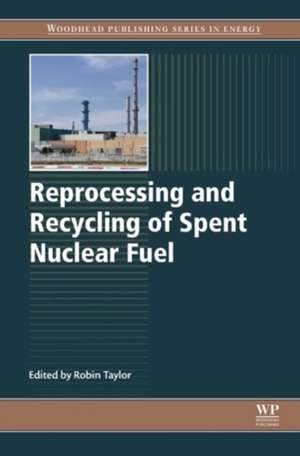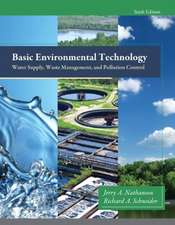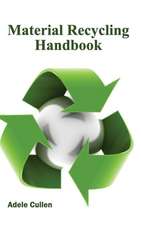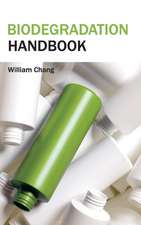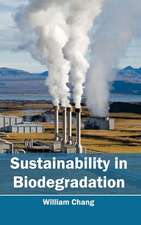Reprocessing and Recycling of Spent Nuclear Fuel: Woodhead Publishing Series in Energy
Editat de Robin Tayloren Limba Engleză Hardback – 14 apr 2015
- Expert introduction to the recycling and reprocessing of spent nuclear fuel
- Detailed overview of past and current technologies, the possible implications of Generation IV nuclear reactors, and associated safely and security issues
- A lucid exploration of aqueous-based reprocessing methods and pyrochemical methods
Din seria Woodhead Publishing Series in Energy
-
 Preț: 853.22 lei
Preț: 853.22 lei - 24%
 Preț: 1209.19 lei
Preț: 1209.19 lei - 24%
 Preț: 1307.96 lei
Preț: 1307.96 lei - 24%
 Preț: 1386.95 lei
Preț: 1386.95 lei - 9%
 Preț: 900.25 lei
Preț: 900.25 lei - 9%
 Preț: 1067.83 lei
Preț: 1067.83 lei - 29%
 Preț: 1071.46 lei
Preț: 1071.46 lei - 9%
 Preț: 950.40 lei
Preț: 950.40 lei - 9%
 Preț: 1011.50 lei
Preț: 1011.50 lei - 29%
 Preț: 1071.13 lei
Preț: 1071.13 lei - 9%
 Preț: 1309.35 lei
Preț: 1309.35 lei - 39%
 Preț: 1047.65 lei
Preț: 1047.65 lei - 9%
 Preț: 949.23 lei
Preț: 949.23 lei - 24%
 Preț: 1688.64 lei
Preț: 1688.64 lei - 9%
 Preț: 1049.56 lei
Preț: 1049.56 lei - 27%
 Preț: 1937.44 lei
Preț: 1937.44 lei - 23%
 Preț: 1519.01 lei
Preț: 1519.01 lei - 23%
 Preț: 1074.68 lei
Preț: 1074.68 lei - 29%
 Preț: 981.24 lei
Preț: 981.24 lei - 9%
 Preț: 1397.24 lei
Preț: 1397.24 lei - 39%
 Preț: 1397.48 lei
Preț: 1397.48 lei - 9%
 Preț: 945.89 lei
Preț: 945.89 lei - 9%
 Preț: 1073.87 lei
Preț: 1073.87 lei - 9%
 Preț: 1514.09 lei
Preț: 1514.09 lei - 9%
 Preț: 1020.23 lei
Preț: 1020.23 lei - 39%
 Preț: 880.81 lei
Preț: 880.81 lei - 9%
 Preț: 950.94 lei
Preț: 950.94 lei - 39%
 Preț: 1225.96 lei
Preț: 1225.96 lei - 9%
 Preț: 1214.08 lei
Preț: 1214.08 lei - 39%
 Preț: 1085.98 lei
Preț: 1085.98 lei - 9%
 Preț: 868.43 lei
Preț: 868.43 lei - 24%
 Preț: 1615.93 lei
Preț: 1615.93 lei - 31%
 Preț: 927.68 lei
Preț: 927.68 lei - 24%
 Preț: 1077.86 lei
Preț: 1077.86 lei - 9%
 Preț: 946.04 lei
Preț: 946.04 lei - 9%
 Preț: 952.05 lei
Preț: 952.05 lei - 9%
 Preț: 1165.33 lei
Preț: 1165.33 lei - 24%
 Preț: 1307.96 lei
Preț: 1307.96 lei - 29%
 Preț: 1213.47 lei
Preț: 1213.47 lei - 24%
 Preț: 1075.25 lei
Preț: 1075.25 lei - 24%
 Preț: 1048.44 lei
Preț: 1048.44 lei - 29%
 Preț: 1454.22 lei
Preț: 1454.22 lei - 39%
 Preț: 1285.27 lei
Preț: 1285.27 lei - 9%
 Preț: 952.68 lei
Preț: 952.68 lei - 23%
 Preț: 878.04 lei
Preț: 878.04 lei - 9%
 Preț: 951.98 lei
Preț: 951.98 lei - 9%
 Preț: 1209.42 lei
Preț: 1209.42 lei - 9%
 Preț: 1233.82 lei
Preț: 1233.82 lei
Preț: 1344.70 lei
Preț vechi: 1477.70 lei
-9% Nou
Puncte Express: 2017
Preț estimativ în valută:
257.30€ • 268.65$ • 212.95£
257.30€ • 268.65$ • 212.95£
Carte tipărită la comandă
Livrare economică 29 martie-12 aprilie
Preluare comenzi: 021 569.72.76
Specificații
ISBN-13: 9781782422129
ISBN-10: 1782422129
Pagini: 684
Dimensiuni: 152 x 229 x 57 mm
Greutate: 1.41 kg
Editura: ELSEVIER SCIENCE
Seria Woodhead Publishing Series in Energy
ISBN-10: 1782422129
Pagini: 684
Dimensiuni: 152 x 229 x 57 mm
Greutate: 1.41 kg
Editura: ELSEVIER SCIENCE
Seria Woodhead Publishing Series in Energy
Public țintă
R&D professionals and postgraduate working on the separation and recycling of spent nuclear fuelCuprins
Preface
Part 1 Introductory issues and future challenges
1. Introduction to the reprocessing and recycling of spent nuclear fuels
2. Role of recycling in advanced nuclear fuel cycles
3. Key challenges in advanced reprocessing of spent nuclear fuels
4 Safety and security issues in the reprocessing and recycling of spent nuclear fuels for advanced fuel cycles
Part 2 Advances in aqueous separation processes
5. Current head-end technologies and future developments in the reprocessing of spent nuclear fuels
6. Process engineering design for the reprocessing and recycling of spent nuclear fuels
7. The use of organic extractants in solvent extraction processes in the partitioning of spent nuclear fuels
8. Radiation chemistry in the reprocessing and recycling of spent nuclear fuels
9. Reprocessing of spent fast reactor nuclear fuels
10. Minor actinide separation in the reprocessing of spent nuclear fuels: recent advances in Europe
11. Minor actinide separation in the reprocessing of spent nuclear fuels: recent advances in the USA
12. Advanced thermal denitration conversion processes for aqueous based reprocessing and recycling of spent nuclear fuels
13. The co-precipitation and conversion of mixed actinide oxalates for aqueous based reprocessing of spent nuclear fuels
14. Gelation and other innovative conversion processes for aqueous based reprocessing and recycling of spent nuclear fuels
Part 3 Pyrochemical processes
15. International developments in electrorefining for pyrochemical processing of spent nuclear fuels
16. Oxide electro-reduction and other techniques for pyrochemical processing of spent nuclear fuels: developments in Korea
17. Pyrochemical processes for recovery of actinides from spent nuclear fuels: European developments
18. Pyrochemical fuel cycle technologies for processing of spent nuclear fuels: developments in Japan
Part 4 Implementation of advanced closed fuel cycles
19. Development of closed nuclear fuel cycles in the United States
20. Development of closed nuclear fuel cycles in China
21. Development of closed nuclear fuel cycles in Korea
22. Development of closed nuclear fuel cycles in Japan
23. Proliferation resistance, used fuel and multinational approaches to the provision of fuel cycle services
24. Developments in reprocessing of spent nuclear fuels for the thorium fuel cycle
Part 1 Introductory issues and future challenges
1. Introduction to the reprocessing and recycling of spent nuclear fuels
2. Role of recycling in advanced nuclear fuel cycles
3. Key challenges in advanced reprocessing of spent nuclear fuels
4 Safety and security issues in the reprocessing and recycling of spent nuclear fuels for advanced fuel cycles
Part 2 Advances in aqueous separation processes
5. Current head-end technologies and future developments in the reprocessing of spent nuclear fuels
6. Process engineering design for the reprocessing and recycling of spent nuclear fuels
7. The use of organic extractants in solvent extraction processes in the partitioning of spent nuclear fuels
8. Radiation chemistry in the reprocessing and recycling of spent nuclear fuels
9. Reprocessing of spent fast reactor nuclear fuels
10. Minor actinide separation in the reprocessing of spent nuclear fuels: recent advances in Europe
11. Minor actinide separation in the reprocessing of spent nuclear fuels: recent advances in the USA
12. Advanced thermal denitration conversion processes for aqueous based reprocessing and recycling of spent nuclear fuels
13. The co-precipitation and conversion of mixed actinide oxalates for aqueous based reprocessing of spent nuclear fuels
14. Gelation and other innovative conversion processes for aqueous based reprocessing and recycling of spent nuclear fuels
Part 3 Pyrochemical processes
15. International developments in electrorefining for pyrochemical processing of spent nuclear fuels
16. Oxide electro-reduction and other techniques for pyrochemical processing of spent nuclear fuels: developments in Korea
17. Pyrochemical processes for recovery of actinides from spent nuclear fuels: European developments
18. Pyrochemical fuel cycle technologies for processing of spent nuclear fuels: developments in Japan
Part 4 Implementation of advanced closed fuel cycles
19. Development of closed nuclear fuel cycles in the United States
20. Development of closed nuclear fuel cycles in China
21. Development of closed nuclear fuel cycles in Korea
22. Development of closed nuclear fuel cycles in Japan
23. Proliferation resistance, used fuel and multinational approaches to the provision of fuel cycle services
24. Developments in reprocessing of spent nuclear fuels for the thorium fuel cycle
